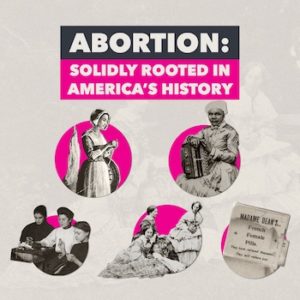
*Black history and American abortion are affirmed on this date in 1500. African women endured many crimes against humanity as part of the Middle Passage.
White rape from enslavers and forced childbearing to supply labor for the slave base agrarian culture of the 13 colonies, Antebellum South, and more. Beginning in the 17th century, abortion and infanticide were often used. Abortion among Black women in America was not a result of the tools of domination. Moreover, it was a tool of resistance and a product of African knowledge. Some women used alum water for defiance and survival, whereas others in urban areas relied on petroleum jelly and quinine concoctions.
Visible Black reproductive leadership for African women enslaved in America came in many forms. Writers (Mary Burrill) and abolitionists (Sojourner Truth) were prevalent. Women’s leadership encompassed the entire Western Hemisphere and evolved into havens for Black communities from Argentina and Brazil to Costa Rica, Mexico, and many Black settlements in America. During and after the American Civil War, freedmen and freedwomen, the middle class, and the Black Bourgeois sought reproductive information. This learning was through sources such as the Black women’s newsletter, The Women’s Era. Black women took on organizational efforts for this and other issues with the National Association of Colored Women’s Clubs, the Northeastern Federation of Colored Women’s Clubs, and others.
Another significant reason for Black women to fight for reproductive rights has been the constant assault from the American white philosophy that demeans the Black race and women. This tactic evolved from biological determinism in the late 1800s. They used pseudo-scientific theories to suppress African people and promote white racial superiority. White men like Eugenicist Granville Hall and Walter Plecker were responsible for a rationale that instilled racial segregation for control. In 1924, the Racial Integrity Act was passed in Virginia. This added to the history of the episodes of forced racial control directed at Black women.
During the mid-20th century, abortions for Black women happened through health professionals operating illegally in America. Some women traveled to Mexico, while white women traveled to the deep South and Black urban communities to get abortions from Black midwives. In the 1950s, Dr. Dorothy Brown became the first state legislator to propose a bill for abortion in America. During the 1960s American Civil Rights movement, some Black nationalists campaigned against family planning, some advocating shutting abortion clinics, this complicated relationships between various groups. The Black Power Conference in 1967 drafted an an-contraception resolution. Yet, the Black Panther Party supported abortions and contraceptives on demand.
The 21st-century
Abortion rates for all women have been declining in the United States for a quarter of a century, from 29.3 per 1,000 women aged 15–44 in 1981 to a historic low (post-Roe v. Wade) of 19.4 in 2005. The number of abortions has been falling, too, dropping to 1.2 million in 2005. White women obtain about one-third of all abortions, and Black women obtain 37%. Latinas comprise a smaller proportion of the women who have abortions, and Asians, Pacific Islanders, Native Americans, and women of mixed race obtain the rest.
The abortion rates among non-white women communities have followed a downward trend over the three decades of legal abortion. At the same time, however, Black women consistently have had the highest abortion rates, followed by Hispanic women (see chart). Abortion holds even when controlling for income: At every income level, black women have higher abortion rates than whites or Hispanics, except for women below the poverty line, where Hispanic women have slightly higher rates than black women. This article’s date was chosen to coincide with the 2022 United States Supreme Court’s decision to repeal the 1973 Roe v. Wade abortion rights law.